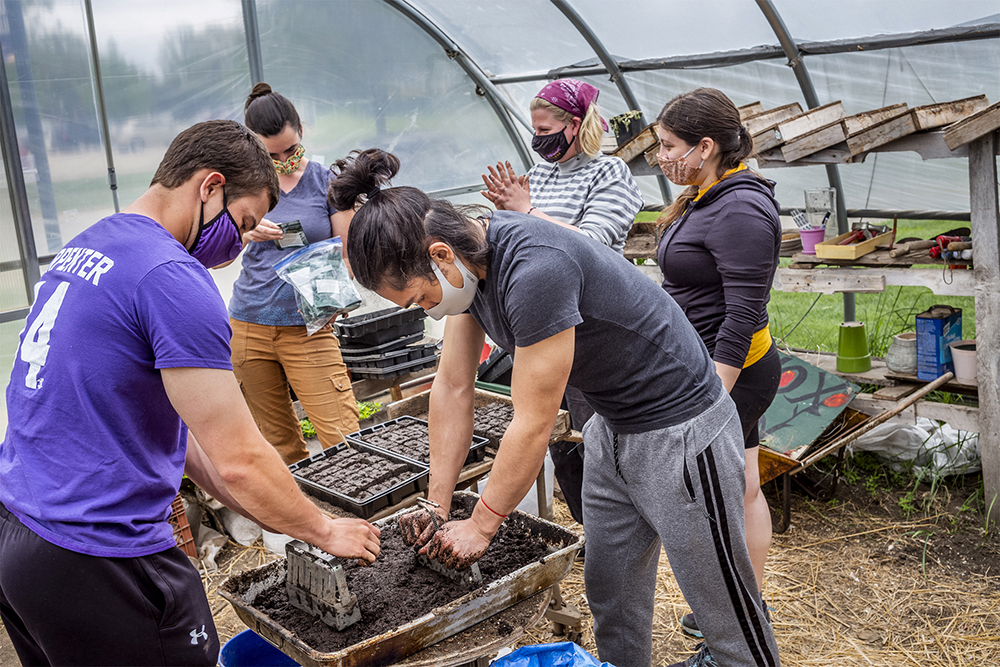
Knox College students Noah Sainato, foreground left, and Ethan Bumpers form soil seed containers at the Knox College Farm on the west edge of the Galesburg college campus. In the background, from left, recent Knox graduate Acacia Berg, senior Fay Swift and freshman Julia Darter prepare seeds for the soil containers that will then be placed under grow lamps in an adjacent high tunnel. (PHOTO BY DAVID ZALAZNIK)
GALESBURG — Started in 2014 as a student initiative, the one-acre Knox College Farm has blossomed into a chemical-free operation that produced more than 2,300 pounds of food last year used in the school cafeteria and shared with the community.
But the primary product of the farm is education, said farm manager Kristina Hope.
More than 100 students and faculty toil at the farm, some as volunteers and some to satisfy required service hours.
There are also some paid positions for students working up to 10 hours a week at the farm.
Students come from rural communities, major metropolitan cities and foreign countries. All are drawn to the farm to learn more about the connections between eating, food, sustainability and justice. It’s embodied learning.
The operation is organic but does not have the official organic certification – a regulatory process students don’t need to understand why no chemicals are used on the property, even if that means more labor.
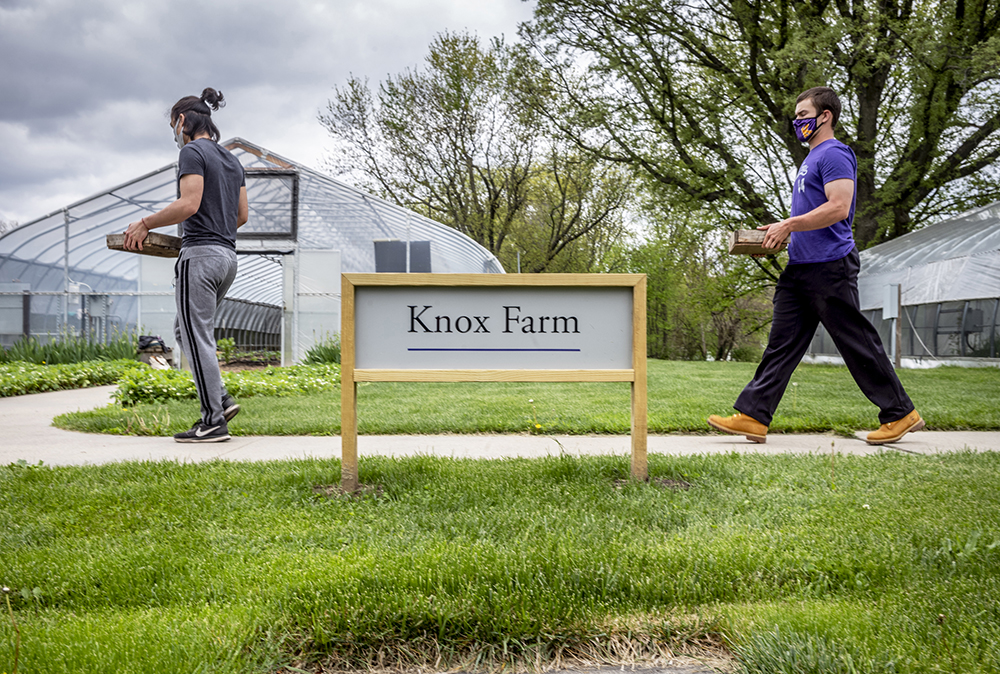
Ethan Bumpers, left, and Noah Sainato carry trays of seed containers to a high tunnel where they will be placed under grow lights until the outside soil temperature is warm enough to plant them outside in the ground. (PHOTOS BY DAVID ZALAZNIK)
On a recent breezy spring day, Noah Sainato and Ethan Bumpers were compressing soil and compost into seed containers. With this process, the ubiquitous plastic seed containers are not needed. One goal of the farm operation is to minimize plastic use.
Sainato, 20, is a sophomore majoring in accounting. He comes from St. Louis and said he used to be “skeptical” of vegetables. Bumpers, 20, is a junior majoring in anthropology and sociology and comes from the Chicago area. He says he’s developed a “real taste” for spinach.
Acacia Berg graduated recently but still works on the Knox College Farm. She has developed a taste for edamame.
“I grew up in rural Wisconsin and all the farms around us grew corn and soybeans but I’d never seen edamame and it seems so exotic,” she said about the young pods of soybeans.
Hope said that every year the farm operation improves. They save seeds and in subsequent years find the produce has improved.
“We saved arugula seeds last year and we can see the difference in viability,” she said.
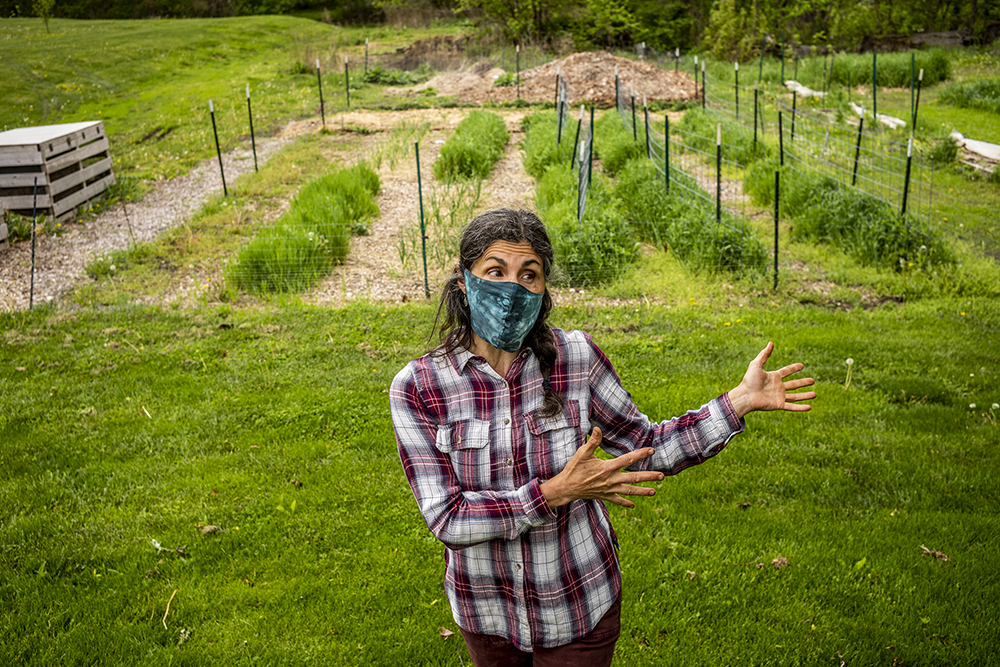
Kristina Hope, manager of the Knox College Farm, explains the operation that includes row crops, two high tunnels, a small orchard and composting bins. The one-acre farm follows organic practices and uses no chemicals. (PHOTO BY DAVID ZALAZNIK)
The operation includes two high tunnels, row cropping, a small orchard and composting system. Even before the outside soil warms, students can work in the high tunnels where seedlings start and cold-hardy vegetables can thrive. Last year, students inoculated mushroom spores into logs for mushroom farming.
Through a special agreement with a local tree service, the farm gets free wood chips that are used on paths.
“The tree service would prefer to bring the chips here rather than a landfill,” Hope said.
Cover crops are used on the property to help fix nitrogen in the soil and prevent erosion.
“The soil used to be terrible here, and we added compost and use cover crops to improve soil health,” Hope said.
“Biodiversity is essential for a healthy operation and a healthy food system. That leads to health for people. We can do a better job when farming engages in soil health, resilience and regenerative practices.”
In addition to organic farming, Hope is an herbalist and the farm includes many beneficial herbs.
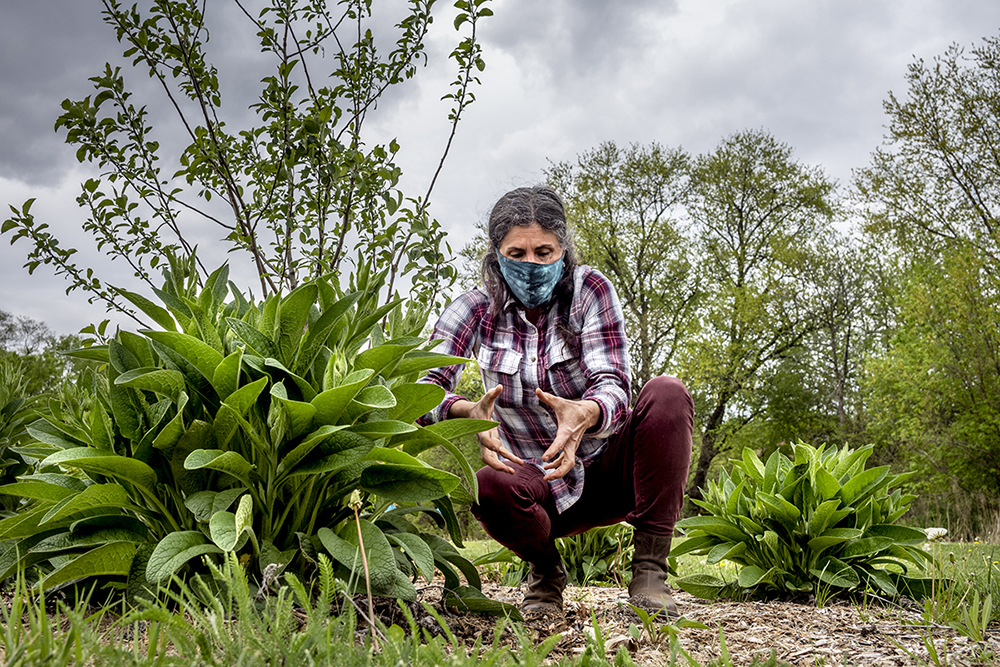
Kristina Hope explains the herbs planted in the orchard help attract pollinators, enrich soil and provide another crop for harvesting. Comfrey and yarrow are important herbs in the operation. (PHOTO BY DAVID ZALAZNIK)
Walking through the orchard, Hope pointed out yarrow and comfrey.
“Comfrey does well in compacted soil. Herbs can suppress weeds, enrich the soil and attract good pollinators,” she said.
There is a small patch of milkweed volunteers. Milkweed is the primary food for Monarch butterfly larvae, Hope said noting that intermixing crops helps reduce insect pests while encouraging beneficial insects.
Currently, the farm uses city water and a drip system but has plans for a water catchment system that can store excess rain and use it during dry periods.
Students write grants for major improvements at the farm such as the water catchment system.
Hope’s job as farm manager is part of an endowed gift that supports sustainability initiatives at Knox donated by Kirsten Mogbo ’76.
Some students come to the Knox College Farm with minimal exposure to vegetables and raise an eyebrow at the notion of eating dandelion greens.
“But after a while, students start asking for salads of dandelion greens,” Hope said. “This is really food at its best.”
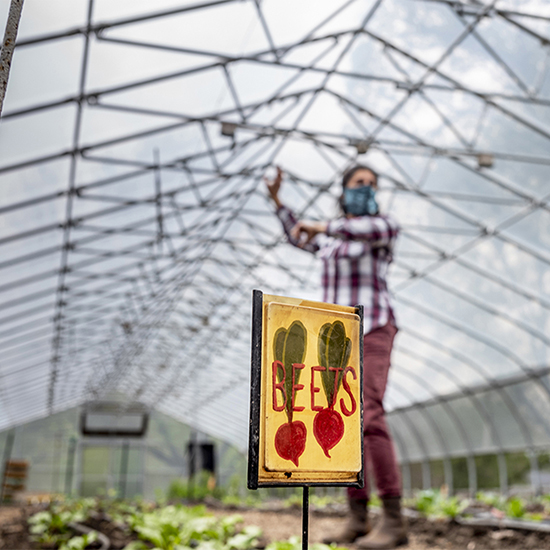
Kristina Hope explains the rows of beets growing in the wind tunnel. (PHOTO BY DAVID ZALAZNIK)
